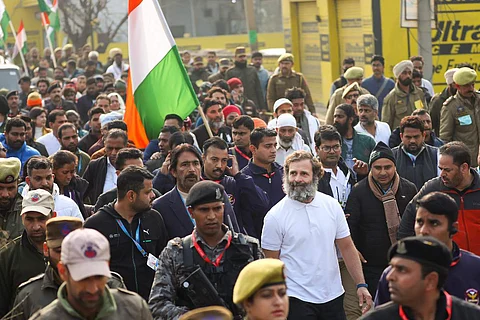

Congress leader Rahul Gandhi, who has been disqualified as the Member of Parliament from the Wayanad Lok Sabha constituency, might not be able to contest elections for the next eight years, unless a higher court overturns the conviction. Rahul was convicted by a Gujarat court on Thursday, March 23, in a criminal defamation case. The court also sentenced him to two years of imprisonment, but the sentence has been suspended for 30 days.
On Friday, the Lok Sabha Secretariat announced Rahul’s disqualification, saying, “Consequent upon his conviction by the Court of Chief Judicial Magistrate, Surat … Rahul Gandhi, Member of Lok Sabha representing the Wayanad Parliamentary Constituency of Kerala, stands disqualified from the membership of Lok Sabha from the date of his conviction i.e. March 23, 2023, in terms of the provisions of Article 102(1)(e) of the Constitution of India read with Section 8 of the Representation of the People Act, 1951.”
Article 102(1)(e) states, “A person shall be disqualified for being chosen as, and for being, a member of either House of Parliament if he is so disqualified by or under any law made by Parliament.” Rahul has been disqualified as per the Representation of the People Act (RPA). This means that there are chances that he might not be able to contest elections for eight years, from the date of his conviction. Here is how:
The RPA is the law that governs elections and elected representatives in India. According to section 8 of the Act, a person can be disqualified as an MP or MLA, if they are convicted under certain offences and/or sentenced to more than two years of imprisonment. In Rahul’s case, though he has not been convicted of an offence listed under section 8, the quantum of his sentence is two years, which attracts disqualification. However, Rahul Gandhi is yet to appeal to a higher court in this regard.
Speaking to TNM, a former Chief Election Commissioner (CEC) said that only the sentence, and not the conviction, was suspended. “So far, there has been no stay on the sentence and the conviction. If the conviction is not stayed until later, say till April 2024, Rahul might not be able to contest the elections,” the former CEC said, adding that the 30 day suspension is only to appeal and that it does not play any role in postponing disqualification.
The RPA also states that a convicted person will be disqualified for a period of six years from the date of conviction. If there has been an imprisonment, then the person will continue to be disqualified for a further period of six years since their release.
In 2013, Supreme Court passed a judgement in Lily Thomas vs Union of India and Others, where section 8(4) of the Act that included a provision for representatives to not be disqualified for three months even if they were convicted, was struck down. Section 8(4) stated that if a person was an MP or MLA on the date of the conviction, their disqualification will not come into force until three months from the date of conviction. Further, if an appeal is filed, then they will not be disqualified until the appeal is disposed of. The court, through the 2013 judgement, struck down this section and declared it “ultra vires of the Constitution.” The then Congress-led United Progressive Alliance (UPA) government passed an ordinance to overturn this court ruling. But it was subsequently withdrawn on October 3, 2013. Rahul Gandhi had also, then, asked to ‘tear up and throw away’ the ordinance deeming it “complete nonsense.” In a later interview to the Hindustan Times, Rahul admitted that he had made a mistake.
MR Madhavan, President and co-founder of PRS Legislative Research, said, “My understanding of this is that prior to 2013, an MP or MLA had 3 months time to file an appeal according to the RPA. But in 2013, an SC judgement [Lily Thomas vs Union of India] said that the person must be disqualified immediately. Now the question is what happens if there is a stay on conviction. According to a 2018 judgement [Lok Prahari vs Union of India], if the conviction is suspended, then disqualification will also be suspended,” he said.
Since the Lily Thomas judgement, many MPs and MLAs were disqualified immediately after their conviction. Former Union minister Rasheed Masood was the first person to be disqualified, on October 1, 2013. Others include former minister Lalu Prasad Yadav, former Tamil Nadu chief minister J Jayalalithaa, Rajya Sabha MP Rasheed Masud, and most recently, Lakshadweep MP Mohammed Faizal.
Referring to the case of Lakshadweep MP Mohammed Faizal, who was convicted in a murder case, but got a stay order from the Kerala High Court on the conviction and the sentence, Madhavan said, “The High Court stayed his conviction in January 2023, but he has still not been reinstated. This reinstatement should be automatic.” Madhavan added that if the conviction is not suspended or if he is not acquitted by any appellate court, Rahul Gandhi will not be able to contest the 2024 and 2029 polls.